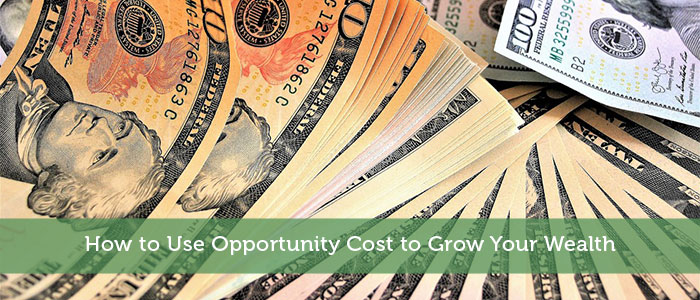Are you familiar with opportunity cost? Most people in business have come across this term early in their careers, but everyone, regardless of profession or interest, can use opportunity cost to their advantage.
This is especially true when it comes to investing. If you think through your investments before putting money into them, you can pick better options and thus increase the potential return you earn.
Let’s get started to see this in action.
What Is Opportunity Cost
In its basic form, opportunity cost is the benefit received versus the potential benefit from another decision. For example, let’s say you run an airline. Half of your plane is booked and the other half of the seats is empty.
You could decide to do nothing and try to sell some of those open seats for full price. Or you could drop the price and try to fill the seats for less money.
The opportunity cost of holding out for selling full-price seats is earning a smaller profit by selling open seats at a discount.
With the recent tax cuts, many companies have decided to hand out bonuses to employees versus reinvesting the money into equipment. You can be sure they did their analysis to determine the opportunity cost of this decision.
Opportunity Cost For Investors
So how does opportunity help you as an investor? If you use it to your full advantage, it will help you to make smarter investment decisions. Many times, we make our decisions based on emotion. As a result, many times we never earn the returns we could.
By taking the time to compare investments, you can make a better decision. For example, you might want to invest in a Motley Fool stock because you are hearing good things about it.
But if you wait and compare it against another potential stock, you might realize that the other stock is a better investment given your goals and risk tolerance.
Recommended Stock Investing Posts:
- The Truth About Money Review
- Day Traders Must Use Volume Weighted Average Price
- Bollinger Bands Trading Strategy
- Should Blue Chip Stocks Be Your First Investment
- Leveraged ETFs vs Futures and Options
- Advantages of Investing in Small Cap Stocks
- Traditional IRA vs Roth IRA
- Teaching Children to Invest in Stocks
Taking Risk Into Account
Speaking of risk, there is an important part of opportunity cost that you need to be aware of in order to make the best decision. This is taking risk into account.
More specifically, you have to make sure the risk of the two investments you are comparing are on equal footing. For example, if you are deciding between investing in treasury bills and a small-cap stock, your decision could be flawed because the small-cap stock is going to provide a higher return.
But the treasury bills could be a better investment for you based on your risk tolerance. In other words, you cannot just define the better investment in terms of potential return.
Applying Opportunity Cost To Your Life
The great thing about opportunity cost is that you can use in every area of your life. Sadly, most people will only use this when making a large purchase or if they have a big decision to make.
They will weigh the advantages and disadvantages to come to the best decision. This is great, but if you can use opportunity cost in other areas, you could grow your wealth substantially.
For example, many people pass up an employer match in their 401k plan for a higher paycheck. But the free money from the 401k match could grow into much more money than what is received in their paycheck.
Similarly, many people forego saving money in exchange for buying things they don’t really need. If they could stop for a minute and think through purchases, they could end up saving a lot of money over the course of their lives.
Final Thoughts
At the end of the day, knowing and using opportunity cost can help you make better investment decisions. And by making better investment decisions, you can grow your wealth much faster.
Additionally, you can use opportunity cost in other areas of your life as well. In fact, the more you use it, the greater the potential for living the best life possible becomes.





I remember learning about opportunity cost while at college. It is a theory that has always stayed with me. While I learned about it in a business context, it was easy to see how it can be applied to individuals. Whenever I am faced with making a purchase, I think about the opportunity cost. It especially applies to wants vs needs.